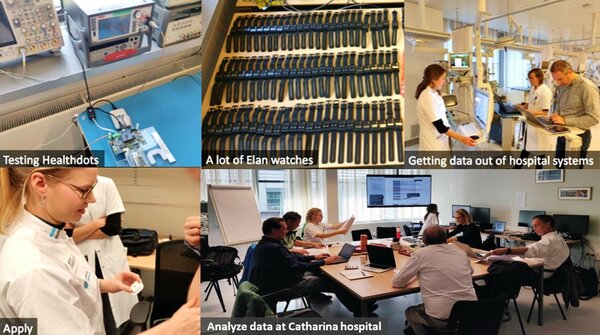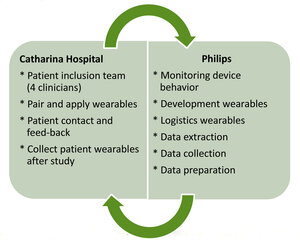In this article we describe a strong case of e/MTIC collaboration over the full healthcare value chain to speed up clinical innovation. The TRICA study (which stands for Transitional Care) collects data from wearables for post-operative monitoring of recovery and potential complications. It is one of the world’s first studies of its kind with a start in 2018. It is a collaboration of over 35 professionals in the e/MTIC ecosystem including Philips, multiple clinical experts from the Catharina hospital and TU/e PhDs. For this study 350 bariatric and major abdominal surgery patients will be included, from which 300 have already finished. The principle is to use wearable sensing devices (the Healthdot and smart watches) that continuously collect data such as respiration rate, pulse rate and other relevant data to monitor the recovery of surgery patients at home while being able to early detect complications. This technology can be used to discharge patients early and improving patient experience while receiving high quality care also at home.


The study preparation started only recently in September 2018 with all stakeholders in the value chain and many disciplines such as clinicians, researchers, healthcare economists, technicians and data scientists, addressing the technical aspects, clinical aspects, data management, METC approval and many more subjects. The study officially started in May 2019 and is still running. During the study period, frequent team meetings take place to monitor the study process, resolve issues and establish a rapid and monitored inclusion.
From June 2019, the TRICA data analysis team gathers on a weekly basis for multidisciplinary meetings with 10 experts from Catharina Hospital, TU/e and Philips. These meetings enable discussions on the re-use of established methods, synchronization of various time series, use of clinical and contextual information for prediction and develop a common language, to ensure an increase of accuracy, secure acceleration and fast impact. The plan is to finish the analysis by the end of 2020. We are happy to share the results with you once they are ready for publication.
The TRICA study proves that the e/MTIC approach to healthcare innovation, with close collaboration over the whole value chain, can speed up clinical innovation substantially. From initiating TRICA in September 2018 until completion of the analysis, and readiness for a decision for clinical introduction in December 2020, this study demonstrates a speedy healthcare innovation within just 2.3 years by e/MTIC teamwork.